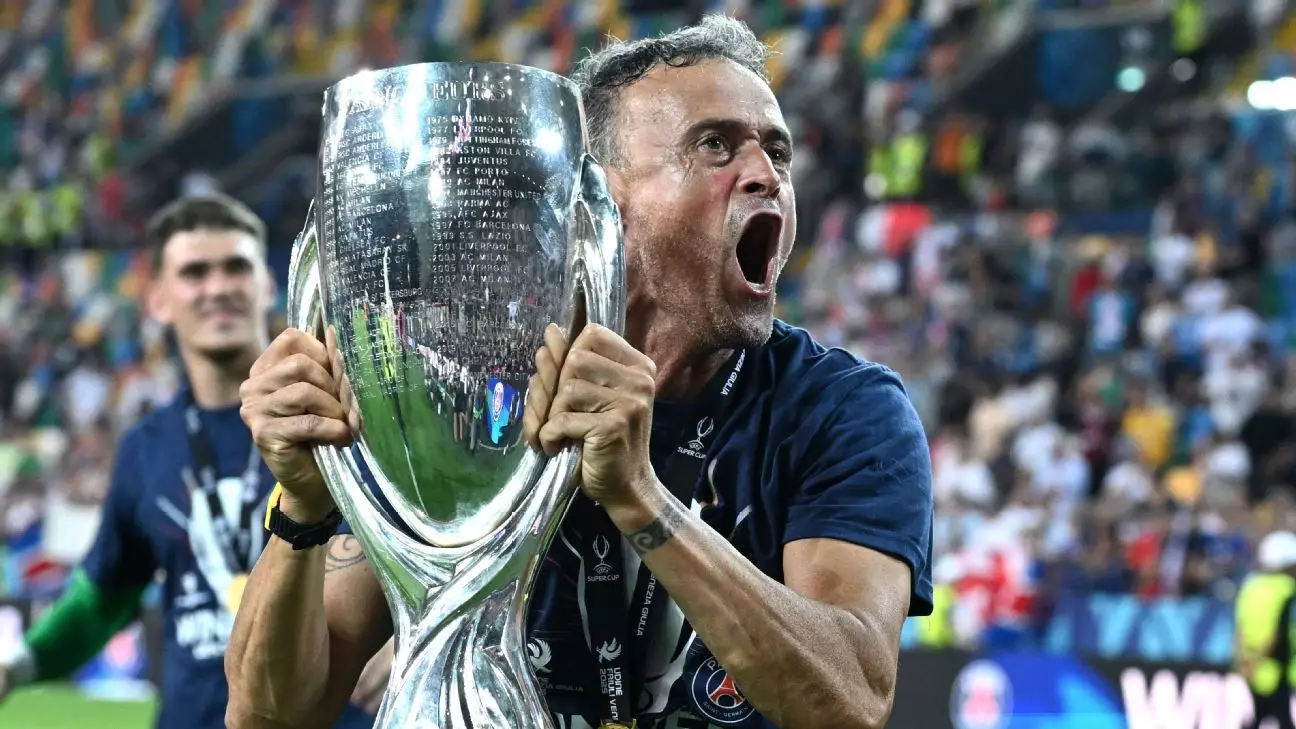Paris Saint-Germain’s dramatic victory in the UEFA Super Cup is a testament not to their dominance, but rather to their relentless will to stay afloat amid glaring shortcomings. Despite the final scoreline suggesting a hard-fought triumph, the underlying narrative reveals significant flaws in PSG’s approach. The team’s coach, Luis Enrique, openly admitted that his side “didn’t deserve to win,” a stark acknowledgment of their ill-prepared state and physical shortcomings. This concession highlights the dangerous complacency often lurking within elite clubs—celebrating achievements without addressing fundamental deficiencies.
In this case, PSG’s limited preseason preparation played a crucial role. Having only recently resumed training after their deep run to the Club World Cup final, players were evidently not at peak fitness. The disparity in physical conditioning was painfully clear, especially when contrasted with Tottenham’s concentrated, dedicated six-week training regimen. Such a gap in preparedness undermined PSG’s chance of asserting control over the match from the outset. It’s a harsh reality that in football, tactical nous and individual talent are insufficient without the stamina and cohesion that rigorous preparation provides.
The Specter of Overconfidence and the Power of Resilience
Attempting to dissect the game’s turning points reveals a team hampered by overconfidence and a failure to recognize the peril lurking in their sluggish start. Tottenham’s early dominance, culminating in a commanding 2-0 lead, exposed PSG’s defensive fragility and lack of cohesion. The quick succession of goals from Tottenham, including a blunder by goalkeeper Lucas Chevalier, emphasized PSG’s vulnerability under pressure and the importance of mental resilience.
However, what makes this story fascinating is the resilience PSG demonstrated in the closing minutes. Lee Kang-in’s fierce shot to halve the deficit ignited hope, and substitute Gonçalo Ramos’s stunning stoppage-time goal set the stage for an improbable comeback. These late dramatics underscore one of football’s most compelling lessons: never underestimate the fighting spirit of well-trained, motivated players. Yet, it also exposes the incomplete nature of PSG’s squad—reliance on moments of individual brilliance rather than cohesive, strategic gameplay.
The Unpredictability of Penalty Shootouts and the Question of Morale
The penalty shootout, often a lottery that can elevate or tarnish legacies, once again proved unpredictable in this match. PSG’s failure on their first attempt with Vitinha was a critical setback, while Tottenham’s pair of missed penalties from Van de Ven and Tel offered PSG a lifeline. Nonetheless, PSG capitalized on their opportunity, converting four consecutive penalties, with Mendes’s decisive shot sealing their victory.
The mental toughness displayed during the shootout reveals a team buoyed by belief, despite a rocky start and moments of individual error. The importance of confidence and composure in such high-stakes situations cannot be overstated. However, it also raises questions about the sustainability of relying on moments ofluck or individual heroism rather than consistent tactical strength throughout the game.
The Symbolism of Debuts and Leadership in Defining Future Expectations
A poignant subplot of this match was Lucas Chevalier’s debut as PSG’s first-choice goalkeeper. Although he was ultimately partly responsible for both goals conceded, his performance embodied the pressures faced by emerging talents. The fact that Gianluigi Donnarumma, typically considered one of the world’s top goalkeepers, was absent and seemingly leaving the club signals shifting ambitions and internal uncertainty in PSG’s squad.
This scenario underscores a broader issue at PSG—balancing high-profile individual talents with developing a resilient, collective identity. The debut performance, coupled with the club’s strategic decisions in the transfer market, highlights an ongoing challenge: maintaining a cohesive unit amidst star power and external expectations. The resilience shown in the face of adversity can serve as a foundation for growth, but only if reinforced by strategic planning and mental fortitude.
The Heart of a Champion: Factoring in Mentality Over Mere Talent
Ultimately, PSG’s Super Cup victory underscores a vital lesson: true champions are defined not solely by talent, but by their unwavering mental resilience. The ability to rally from a seemingly impossible situation, to fight for every inch, and to maintain team cohesion in chaos defines the elite. Despite their shortcomings in preparation and execution, PSG’s players demonstrated that a resilient mindset can sometimes outweigh technical flaws.
Luis Enrique’s acknowledgment of their undeserved win reflects humility and an understanding that championship mentality cannot be cultivated overnight. It takes consistent effort, disciplined training, and a sustained belief that, even when circumstances seem most unfavorable, the will to succeed can turn the tide. PSG’s story from this match is a reminder that in football, perseverance often writes the most compelling narratives, even when the odds are stacked against you.

